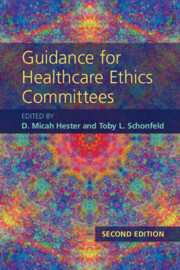Book contents
- Guidance for Healthcare Ethics Committees
- Guidance for Healthcare Ethics Committees
- Copyright page
- Dedication
- Contents
- Contributors
- Preface
- Section 1 The Context of Healthcare Ethics Committee Work
- Section 2 Consultation
- Chapter 7 Ethics Consultation Mission, Vision, Goals, and Process
- Chapter 8 A Method of Consultation
- Chapter 9 Informed Consent
- Chapter 10 Confidentiality and Privacy
- Chapter 11 Decision-Making Capacity
- Chapter 12 Discharge Challenges
- Chapter 13 Surrogate Decision Making
- Chapter 14 Advance Care Planning and End-of-Life Decision-Making
- Chapter 15 Potentially Inappropriate Treatment and Medical Futility
- Chapter 16 Cognitive Dissonance and the Care of Patients with Disorders of Consciousness
- Chapter 17 Ethical Issues in Reproduction
- Chapter 18 Ethical Issues in Neonatology
- Chapter 19 Ethical Issues in Pediatrics
- Chapter 20 Neuroethics
- Chapter 21 Ethical Issues in Clinical Genetics
- Chapter 22 Challenging Issues in Surgical Ethics
- Chapter 23 Psychiatric Ethics
- Section 3 Policy Development and Organizational Issues
- Index
- References
Chapter 19 - Ethical Issues in Pediatrics
from Section 2 - Consultation
Published online by Cambridge University Press: 17 February 2022
- Guidance for Healthcare Ethics Committees
- Guidance for Healthcare Ethics Committees
- Copyright page
- Dedication
- Contents
- Contributors
- Preface
- Section 1 The Context of Healthcare Ethics Committee Work
- Section 2 Consultation
- Chapter 7 Ethics Consultation Mission, Vision, Goals, and Process
- Chapter 8 A Method of Consultation
- Chapter 9 Informed Consent
- Chapter 10 Confidentiality and Privacy
- Chapter 11 Decision-Making Capacity
- Chapter 12 Discharge Challenges
- Chapter 13 Surrogate Decision Making
- Chapter 14 Advance Care Planning and End-of-Life Decision-Making
- Chapter 15 Potentially Inappropriate Treatment and Medical Futility
- Chapter 16 Cognitive Dissonance and the Care of Patients with Disorders of Consciousness
- Chapter 17 Ethical Issues in Reproduction
- Chapter 18 Ethical Issues in Neonatology
- Chapter 19 Ethical Issues in Pediatrics
- Chapter 20 Neuroethics
- Chapter 21 Ethical Issues in Clinical Genetics
- Chapter 22 Challenging Issues in Surgical Ethics
- Chapter 23 Psychiatric Ethics
- Section 3 Policy Development and Organizational Issues
- Index
- References
Summary
Concerns about ethics in the care of children have been central to modern bioethics since its inception over 50 years ago. Key milestones in pediatric bioethics include the controversy over the Willowbrook hepatitis experiments in the 1960s, acknowledgment of the importance of “assent” for children participating in research by the National Commission in the 1970s, and the Baby Doe regulations regarding the treatment of neonates in the 1980s. Despite the prominence of pediatric cases and issues, development of bioethical reasoning during the first 30 years was heavily focused on issues surrounding adults with decisional capacity and the principle of respect for autonomy. In fact, most of the groundbreaking judicial opinions about end-of-life decisions prior to the year 2000 focused on protecting the rights of adults to make autonomous decisions about their own medical care (Menikoff, 2002).
- Type
- Chapter
- Information
- Guidance for Healthcare Ethics Committees , pp. 165 - 174Publisher: Cambridge University PressPrint publication year: 2022



